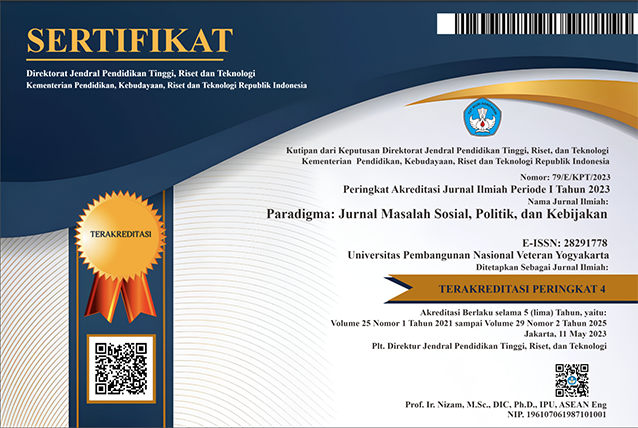Reformasi Birokrasi: Antara Netralitas Politik Dan Tuntutan Pelayanan Publik
DOI:
https://doi.org/10.31315/paradigma.v18i2.2411Keywords:
neutralization of bureaucracy, public servicesAbstract
Bureaucratic reformation ultimately seen as part of an overall reform of the post New Order government. First of all, to establish a neutral bureaucracy of politics. Second of all, to improve services as a public service institution. In the case of a neutral bureaucratic, politics has brought signi cant results. In the general election three times (in 1999, 2004, and 2009), the involvement and mobilization of political support through the bureaucracy was lesser compare to what happened during the New Order government. However, the attempts to do politicized bureaucracy snaking is unavoidable. Firstly, with regard to the nature of bureaucracy that can not be separated from the need to ght for its own interests—in addition to providing public services. Secondly, there is an involment from the political of cials. On the other hand, the attempts to perform public service continued through the decentralization policy. Although in general, decentralization policies have not been able to encourage or strengthen the public services carried out by the bureaucracy. Bureaucratic reformation in Indonesia, requires a long time to complete. Wishing that in order to have a professional bureaucracy and enabling better public services, may not be realized in a short time.
Downloads
How to Cite
Issue
Section
License
The manuscript submitted to Paradigma: Jurnal Masalah Sosial, Politik, dan Kebijakan journals are released under the license of Creative Commons Attribution-Non Commercial- ShareAlike (CC BY SA) if and when the article is accepted for publication.
We declare that:
- This paper has not been published in the same form elsewhere.
- It will not be submitted anywhere else for publication prior to acceptance/rejection by this Journal.
- A copyright permission is obtained for materials published elsewhere and which require this permission for reproduction.
Retained Rights/Terms and Conditions
Authors retain all proprietary rights to the published works, such as (but not limited to) the following rights:
- Copyright and other proprietary rights relating to the article, such as patent rights,
- The right to use the substance of the article in own future works, including lectures and books,
- The right to reproduce the article for own purposes,
- The right to self-archive the article
The right to enter into separate, additional contractual arrangements for the non-exclusive distribution of the article's published version (e.g., post it to an institutional repository or publish it in a book), with an acknowledgment of its initial publication in this journal Paradigma: Jurnal Masalah Sosial, Politik, dan Kebijakan



